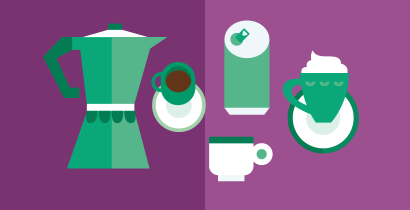Bioactive compounds

Bioactives are compounds that typically occur in small quantities in food and can be beneficial for health. Unlike essential macro- and micronutrients (such as fats, carbohydrates, protein, vitamins and minerals) they are not essential for life and the body can function properly without them. Some examples of bioactive compounds commonly found in our diets are caffeine, polyphenols, and flavonoids.
What does caffeine do to our body?
31 July 2024Coffee, tea, and many other foods and drinks contain caffeine. Explore the effects of caffeine on cardiovascular and digestive health, migraines, and hydration.
Caffeine (Infographic)
31 March 2019What are the effects of caffeine,how much is found in different products and what is a reasonable level of consumption all explained on one easy to understand infographic...
Caffeine (Q&A)
08 December 2016Caffeine is a naturally-occurring substance found in some plant-based food and drink ingredients, such as tea leaves and coffee or cocoa beans (and therefore chocolate). It is added to other food and drink products like cola-based soft drinks...
Q&A on Energy Drinks: Caffeine and Other Ingredients
06 July 2015‘Energy’ drinks are generally classified as drinks which aim to aid mental and physical stimulation and give an increased sense of alertness...
EFSA opinion on the safety of caffeine
23 June 2015On 27th May 2015, the European Food Safety Authority (EFSA) published its scientific opinion on the safety of caffeine consumed through the diet. The report, prepared by the EFSA Panel...
Polyphenols
02 June 2015Diets high in fruits and vegetables are associated with a lower risk of diseases such as cardiovascular disease (CVD) and cancer. It is thought that dietary compounds including polyphenols...
7 Myths and Facts about Caffeine
01 September 2002Caffeine is a naturally occurring substance (an alkaloid) found in the leaves, seeds and fruits of more than 63 plant species worldwide. Products containing caffeine including tea, coffee and some soft drinks have been enjoyed all over the world for many years.






